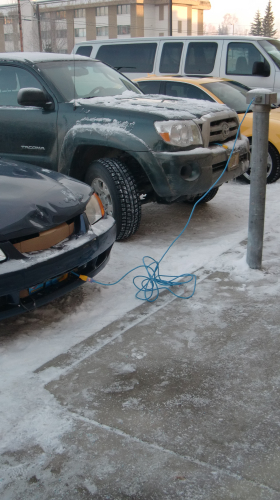Given that the infamous Polar Vortex (said in a spooky voice) has made its way into the news so much this winter it seems appropriate to give you a better idea of what I consider to be the coldest weather I (and many-but not all- of the other PolarTREC teachers here at orientation) have ever experienced.
Being from Colorado, we have had our share of cold days-and even had school canceled due to below zero temps- but they are fairly warm compared to the cold here in Fairbanks. Each evening the temperatures have dropped, the coldest being -34ºF, and the warmest during midday being -7ºF! I have to say, that's pretty cold, but what does that type of cold feel like?
Here are the some observations of how these temperatures impact life in Fairbanks:
- Breathing the air hurts. Your nose hairs and anything else in your nose freezes. If you take too deep of a breath, you cough.
http://youtu.be/kfD11omFQ88 The snow squeaks as you walk on it, this is due to the individual ice crystals compacting and rubbing together vs. melting under the pressure of your foot and thus eliminating the sound from friction at warmer temperatures. (Have you ever noticed this at your home?)
 Engines use block heaters to keep the engine warm and allow the car to start in cold temperatures.
Engines use block heaters to keep the engine warm and allow the car to start in cold temperatures.
Cars must be plugged in to ensure that they are able to start through the use of a block heater to keep the engine slightly warm at all times.
- If you throw a cup of hot water up into the air it instantly turns to snow!
http://youtu.be/TKGOas9G9Ac
 Lauren Watel after 10 minutes outside in Fairbanks at -26ºF.
Lauren Watel after 10 minutes outside in Fairbanks at -26ºF.
- If you are outside for very long you form small ice crystals on your exposed hair, eyelashes, and eyebrows! This took only about 10 minutes of walking outside.
Any exposed skin feels like it is being burned by the cold, and this is without any wind! You have to cover up everything or risk frost bite.
 Winter in Fairbanks calls for very snowpacked and icy roads.
Winter in Fairbanks calls for very snowpacked and icy roads.
The roads stay covered in snow and ice. Cars slide at intersections, but drivers have adapted. Many cars have special metal studded tires for extra winter grip. Though not everyone chooses to use these.
- Automatic sliding doors are in sets of two, and they alternate which side is open to prevent a direct whoosh of cold air into the warm interior spaces.
- People wear a lot of layers when they venture out. Flannel lined pants, long underwear, wool socks, and even down pants are not uncommon.
- If there is ice fog night time lights form upward pillars of light, looking like massive pillars radiating into the sky.
People in Fairbanks are tough though. This cold doesn't scare them. Sure there are fewer people outside, but I have still seen people walking on the street and riding their bikes around town. There are still ravens scrounging for food at dumpsters. And unless the temperatures are below -20ºF school kids still have recess outside! It sure starts to put some of our whining about the cold temperatures we have had in perspective!
Even though this is cold, it is still no where near the overall lowest temperature record for Fairbanks! What do you think the coldest temperature on record is for Fairbanks? How about Toolik Field Station? The world?


Comments